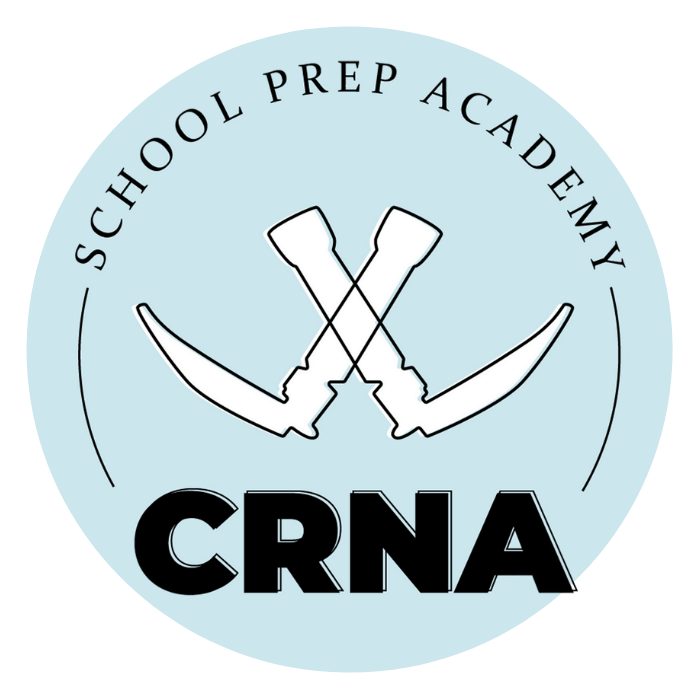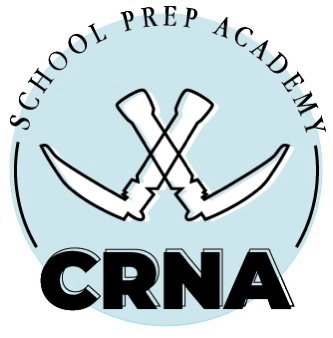
The CRNA Career Path with CRNA Salary Information plus the Top 10 Best CRNA Programs
Are you wondering what exactly a Certified Registered Nurse Anesthetist (CRNA) is, or what they do as a nurse providing anesthesia? If you’re looking for CRNA salary information or want insights into how to become a CRNA, including the top 10 best CRNA programs, this article will provide you with those answers. Let’s dive in!
Download Our Free 8 Steps to CRNA Roadmap Guide👇
Certified Registered Nurse Anesthetists (CRNAs) are advanced practice registered nurses who specialize in administering anesthesia to patients in a variety of medical settings. After becoming a CRNA, they can work independently or in collaboration with anesthesiologists, surgeons, dentists, and other healthcare professionals to provide safe and effective anesthesia care to patients of all ages.
What is a CRNA (Certified Registered Nurse Anesthetist)?
A CRNA is someone who has completed a doctoral degree in nurse anesthesia. They have also passed a national certification examination to become a CRNA. CRNAs are licensed to practice in all 50 states and are authorized to administer anesthesia in a variety of medical settings.
What Do CRNAs Do?
CRNAs provide anesthesia care for a variety of surgical and medical procedures. They work independently and with physician anesthesiologists, surgeons, and other healthcare professionals to determine the appropriate anesthesia for each patient. CRNAs, otherwise known as Nurse Anesthetists, conduct preoperative assessments, administer and monitor anesthesia during surgery, monitor patients’ vital signs, and provide post-operative care. They also provide pain management services for patients with chronic pain conditions.
How to Become a CRNA
To become a CRNA, individuals must first earn a bachelor’s degree in nursing and become a registered nurse (RN). They must then obtain 1-2 years of full-time employment in a high-acuity ICU. Once accepted into CRNA school, they complete a 36-month program and receive a doctoral degree in nurse anesthesia from an accredited program. After completing their education, individuals must pass the National Certification Examination to become a CRNA. The examination is administered by the National Board of Certification and Recertification for Nurse Anesthetists (NBCRNA).
How Much Do CRNAs Make?
According to the Bureau of Labor Statistics (BLS), the median annual CRNA salary was $205,770 in May 2022. The highest 10 percent earned a CRNA salary of more than $239,200 per year, while the lowest 10 percent earned $143,870 per year. The BLS also reported that the highest-paying industries for nurse anesthetists were outpatient care centers, specialty hospitals, and ambulatory health care services.
Where Can CRNAs Work?
CRNAs can work in a variety of medical settings, including hospitals, surgery centers, and physician offices. They also work in dental offices, military facilities, and pain management clinics. Some CRNAs work in rural areas and provide anesthesia care to patients in underserved communities.
How Long Does it Take to Become a CRNA?
The educational path to becoming a CRNA typically takes seven to eight years, but it can take longer. This includes four years of undergraduate education to earn a bachelor’s degree in nursing, followed by three years of graduate education in nurse anesthesia. After completing their education, individuals must pass the national certification examination to become a CRNA. Click here to learn about the fastest way to become a CRNA!
The Top 10 Best CRNA Programs In The USA
In the most recent U.S. News and World Report rankings for CRNA programs, the following schools were ranked as the top 10:
- Virginia Commonwealth University
- Baylor College of Medicine
- Duke University
- Kaiser Permanente School of Anesthesia- California State University Fullerton
- Rush University
- Uniformed Services University of the Health Sciences
- University of Pittsburgh
- University of Texas Health Science Center- Houston
- U.S. Army Graduate Program in Anesthesia Nursing
- Georgetown University
It’s important to note that rankings can vary depending on the methodology and criteria used by each organization, and that there are many other excellent CRNA programs not included in this list. It’s always a good idea to do your own research, talk to current students and consider factors such as program location, cost, curriculum, clinical experience, and faculty expertise when selecting a CRNA program.
Please keep in mind that US News and World Report is not the best way to determine which school is right for you. It is always best practice to talk to current students to ensure they are actually getting a good experience in the program and assessing if it is the right fit for you personally. Just because a school is not listed on US News and World Report does not mean it is not an exceptional school for you personally to attend. Click here to learn more about the best way to pick your CRNA program!
Click here to get a Free Copy of our Most Affordable CRNA Schools Resource!
Is There an Exam That CRNAs Must Pass?
Yes, CRNAs must pass the National Certification Examination (NCE) administered by the National Board of Certification and Recertification for Nurse Anesthetists (NBCRNA) to become licensed. The exam is computer-based and consists of 150-170 multiple-choice questions that test the knowledge and skills needed to practice as a CRNA. The exam covers the following areas:
- Basic sciences
- Advanced principles of anesthesia practice
- Equipment and technology
- Anatomy and physiology
- Pharmacology
- Professional aspects of anesthesia practice
Advice For Future CRNAs
Becoming a CRNA is a challenging and rewarding career path. Here are some tips for those considering this career:
- Research the profession thoroughly and ensure it is the right fit for you.
- Get shadowing experience. Not only do many programs require it, it will help you best understand the role of a CRNA and whether it is the right career for you. Click here for a Free Shadow Documentation Form and learn about the CSPA Virtual Anesthesia Lab Experience!
- Obtain ICU experience as early as possible in your nursing career.
- Maintain a strong GPA and take challenging science courses in preparation for CRNA school.
- Develop strong critical thinking and communication skills.
- Network with current CRNAs to gain insight into the profession and learn about different CRNA programs.
- Join a mentorship community like CRNA School Prep Academy
- Study hard and prepare well for the National Certification Examination.
- Stay up to date with advances in anesthesia practice and continue your education throughout your career.
- Join professional organizations such as the AANA to stay connected to the CRNA community and access valuable resources.
The Career Outlook for CRNAs
According to the Bureau of Labor Statistics (BLS), employment of nurse anesthetists is projected to grow 45% from 2020 to 2030, much faster than the average for all occupations. This growth is due to an aging population, an increased emphasis on preventative care, and expanding healthcare coverage.
Also according to the BLS, the median annual CRNA salary was $205,770 in May 2022. This is significantly higher than the median wage for a registered nurses at $89,010. Click here to learn more about the differences between RN and CRNA!
Where to Find More Information on CRNA Careers
To learn more about CRNA careers, you can visit the following resources:
- American Association of Nurse Anesthetists (AANA) website
- National Board of Certification and Recertification for Nurse Anesthetists (NBCRNA) website
- Bureau of Labor Statistics (BLS) Occupational Outlook Handbook
- Council on Accreditation of Nurse Anesthesia Educational Programs (COA) website
In conclusion, becoming a Certified Registered Nurse Anesthetist is a challenging and rewarding career path. CRNAs are highly skilled professionals who play a critical role in the healthcare system. By obtaining the necessary education, experience, and certification, you can join the ranks of these exceptional healthcare providers and make a positive impact on the lives of your patients. If you are interested in this career, start by researching the profession, obtaining ICU experience, maintaining a strong GPA, developing critical thinking and communication skills, networking with current CRNAs, and joining CRNA School Prep Academy Mentorship Program.
CRNA School Prep Academy has membership options to help YOU achieve your goal of becoming a CRNA, no matter where you are in your journey. Join CRNA School Prep Academy today!


